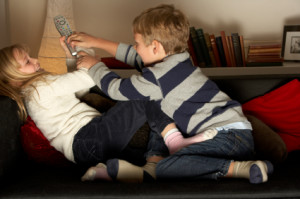 If you have the average 2.2 children, you probably have 2.2 times the interfamily conflict: a.k.a. sibling rivalry. Those of us with siblings all have stories to tell – for better or worse. My brother and I got along pretty well, mainly because he’s seven years younger and spent most of his childhood outside. My main challenge with him was finding him for supper.
If you have the average 2.2 children, you probably have 2.2 times the interfamily conflict: a.k.a. sibling rivalry. Those of us with siblings all have stories to tell – for better or worse. My brother and I got along pretty well, mainly because he’s seven years younger and spent most of his childhood outside. My main challenge with him was finding him for supper.
Brenda[1] also grew up with a brother – one who was five years older. Life with him was a mixed bag, she recalls.
“He’d help me climb up a tree,” she says, “and then leave me up there.”
Now she’s the mother of two boys, aged 3 and 5. With brothers so close in age, there’s a lot of competition for attention from parents … and each other. She and her husband spend much of their time addressing the boys’ constant bickering.
“Kids are good at pushing their siblings’ buttons,” she observes. “They know how to drive each other nuts.”
There may be something to birth order in bullying. Ersilia Menesini and her colleagues at the University of Florence published a study in the British Journal of Development Psychology examining this very idea. First-borns get all the attention before their sibling is born, assume authority, and express it from an early age – perhaps aggressively.
Older siblings model how to behave socially, and if it’s not positive modeling, it can lead younger siblings to exhibit nasty behavior inside and outside the home.
While we brush off sibling rivalry as a normal part of family life, it can get ugly – both psychologically and physically. That’s when it’s better named sibling bullying.
This summer, researchers at the University of New Hampshire revealed that sibling bullying has the same mental health impacts – anxiety, depression, anger – as peer bullying. If a child is victimized at school and at home, the dangers are compounded.
In the study, Corinna Jenkins Tucker and colleagues at the Crimes Against Children Research Center examined a survey of more than 3,500 children and their caregivers across the US.
The survey was designed to uncover how many times the children (aged 0 to 17) had been hurt in the past year (psychologically or physically), who hurt them, and how they were hurt. It also looked at the psychological impact of the damage.
Even if kids under 10 weren’t physically injured, they surprisingly suffered severe distress from typical sibling tussles: things like having older siblings tease them or take their personal possessions away. Naturally, siblings of all ages suffered significant mental distress when physically injured. Tucker and her colleagues found the trauma was the same as with peer bullying, across the board.
Now that we know that sibling bullying is not benign, here are some tips on how to deal with sibling rivalry from experts at EmpoweringParents.com and the Cleveland Clinic:
- Acknowledge each child’s individuality. Sibling rivalry is often the result of envy. If you see that in one of your children, talk about it together, “Hey, we all feel jealous at times.” Point out specific examples of that child’s own achievements. Your children will likelier be cooperative if you listen to their concerns. Be careful not to lavish too much attention on the jealous child when he’s demanding it, which could reinforce jealous behavior. Instead, look for times when that child is behaving well and reinforce his good behavior with your time and love.
- Create a time and place for bickering. In a clever bit of reverse psychology, James Lehman of EmpoweringParents.com suggests establishing a formal time and place for your kids to bicker. Sit them down at a table and tell them they have to argue for a prescribed amount of time – say 15 minutes. They’ll either run out of grievances or they might actually end up having a real discussion!
- When things cool off, help your children learn from the conflict. Sibling disagreements can be a great opportunity to learn how to compromise and approach challenges more positively.
- Adults lead by example. When you stay cool with the other people in your life, your kids will learn from you. Look for experiences that encourage cooperation between all family members, like projects around the home and family vacations
- Parents don’t have to treat kids equally to be fair. You don’t have to give your kids the same rewards at the same time. You just need to be fair, which means handing out age-appropriate rewards and consequences. When it comes to disciplining your child, try to do so with each child privately so you don’t embarrass them in front of silbings – unwittingly escalating family tensions.
Learn More:
C Jenkins Tucker, “Association of Sibling Aggression with Child and Adolescent Mental Health,” Pediatrics, July 2013, pp 80–84
E Menesini, “Bullying among siblings: The role of personality and relational variables,” British Journal of Development Psychology, 2010, pp 921–939
Children’s Health Team, “Sibling Rivalry Tips: 5 for Prevention, 5 for Intervention,” clevelandclinic.org, Aug. 2012
J Lehman, “Siblings At War in Your Home? Declare a Ceasefire Now!” EmpoweringParents.com, Oct 2008

